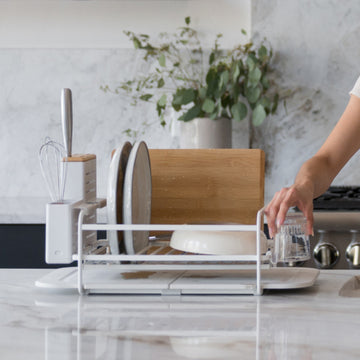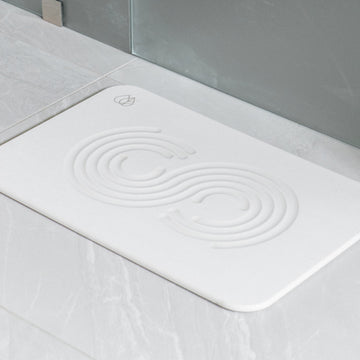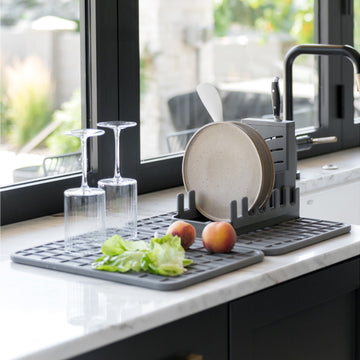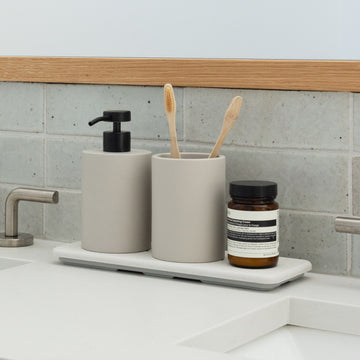Aside from refreshing your home with a little spring cleaning, is there anything better than a clean pair of sheets or a freshly washed shirt? Unfortunately, the laundry process can be pretty toxic to the environment.
If you’re looking to make eco-friendly changes in your day-to-day life, your laundry routine is the perfect way to start! Not only does adopting a more eco-friendly laundry routine help the environment, but it also helps cut down on monthly utility bills while keeping your clothes in good condition for longer.
Ready to make some changes? Here are 7 eco-friendly laundry tips to make washing clothes less toxic for your home environment.
Choose Eco-Friendly Laundry Products
When looking to adopt a more sustainable laundry routine, the obvious first step is to find more eco-friendly cleansing ingredients. Don’t be fooled by so called eco-friendly laundry detergents that market themselves as “green” as they often aren’t. Many that claim to be natural are also filled with synthetic fragrances that have been linked to endocrine disruption.
We’ve tried dozens of ‘better-choice’ eco-laundry detergents. Here are a few of our favorites:
- Our favorite everyday detergent that uses enzymes and more sustainable packaging
- Our favorite option for sports and outdoor wear
Along with choosing a good, eco-friendly laundry detergent, think about the packaging it will come in! Choose a powder that has recyclable packaging or make your own detergent and store them in reusable glass containers.
Last but not least, don’t forget to always check the ingredients. Detergent manufacturers are not required to list all ingredients on packaging, so do your own research. Laundry detergent with a strong perfumed scent may be refreshing at first, but this usually means there are added toxic chemicals you’d rather do without.
Pro Tip: Use what you have first! We know you’ll get excited to make eco-friendly laundry changes, but throwing out your half-used Tide to make the jump is wasteful too.
Wash Less Often
Sometimes adopting a more eco-friendly laundry routine is even easier than you think! Set a goal to do less frequent loads. Cut back on washing half loads for convenience and only run the wash when it’s a full load. When possible, use cold water vs hot; it’s better for your clothes and reduces the amount of energy required.
Believe it or not, many denim brands recommend washing denim every 10 wears. That means wearing your pants a few more times before washing after every wear. Following this same sustainable laundry method will help your clothes last years longer and wear much less.
Reduce Drying
We know everyone loves lying down in a fresh pile of warm laundry, but the drying process is one of the most environmentally harmful steps of the laundry routine. Clothing dryers suck up a considerable amount of energy.
That’s why one of our top eco-friendly laundry tips is to ditch the drying cycle and opt for air drying instead. It’s the easiest way to make a huge difference, plus it can help improve the feng shui of your living space by reducing the clutter in your home. We love this simple bamboo drying rack or this wall-mounted drying rack to save on space.
If you’re air-drying wet clothes and hate to drip water on your floors, don’t worry because the Dorai Bath Stone is a fan favorite in both the bathroom and the laundry room. Simply place the stone under your drying rack and let it take care of the rest. For bigger loads, consider drying your clothes over our Dual Bath Stone instead.
Pro Tip: Drying clothes on a drying rack or clothesline can leave clothes feeling ‘crunchy’ and less soft. Try drying your clothes on a line and then throwing them into the dryer for 5-10 mins on a low heat cycle before putting them away to give them a softer touch.
Sustainable Laundry Means Saying Goodbye to Dryer Sheets
Unfortunately, dryer sheets create additional waste that is not essential to an eco-friendly laundry routine. Did you know laundry sheets can actually damage fabrics over time and cause them to break down faster?
If you want to prevent wrinkles and keep away static, try making the switch to wool dryer balls. These are an affordable solution for a more sustainable laundry routine that can be used for a long time.
Pro Tip: Want your laundry to still smell fresh? Use a drop or two of essential oils on your dryer balls to create fresh-smelling laundry. Citrus is our favorite for clothes and lavender for sheets and towels.
Avoid Dry Cleaning
Embracing a more eco-friendly laundry approach means bidding farewell to traditional dry cleaning and its toxic tendencies. Conventional dry cleaning often relies on harsh chemicals like perchloroethylene, which can leave a trail of environmental damage and potential health risks in its wake.
But fear not, there are greener pastures ahead. Home dry cleaning kits, with their biodegradable and non-toxic solutions, offer a gentler approach to caring for your clothes. Or, if you prefer to leave it to the professionals, seek out eco-conscious dry cleaners who have mastered innovative techniques like liquid carbon dioxide cleaning or wet cleaning with biodegradable detergents.
By choosing to steer clear of traditional dry cleaning, you're not only protecting the longevity of your favorite pieces of clothing but also cultivating a more harmonious and healthy environment. So let your wardrobe flourish without the weight of toxic chemicals by embracing a sustainable laundry approach to dry cleaning. Trust us, your clothes (and the planet) will thank you!
Invest in an Eco-Friendly Washing Machine
Investing in an environmentally friendly washing machine can make a huge difference and that’s why it lands on our list of eco-friendly laundry tips. Choosing an energy-efficient and eco-friendly laundry machine can be beneficial for both your clothes and the planet.
Look for washing machines bearing an Energy Star certification. These eco-friendly laundry machines use significantly less water and energy compared to their conventional counterparts. Which means you'll be saving precious resources and money with every load.
But the benefits don't stop there! Many environmentally friendly washing machines come equipped with innovative features like automatic load sensing and advanced wash cycles.
These ensure that your clothes receive the perfect amount of care while minimizing waste. Some models even boast built-in water filtration systems that allow you to recycle and reuse water for an even greener clean.
Of all of our eco-friendly laundry tips, this one is costly. But in the long run, a well-designed and sustainable laundry machine is a worthwhile investment.
Hand Wash Your Clothes
When it comes to eco-friendly laundry tips, hand washing often emerges as a true champion of sustainability. This age-old practice not only conserves water and energy but also extends the life of your delicate garments and reduces the need for frequent replacements.
When you embrace the art of hand washing, you're treating your clothes with the gentle care they deserve. Simply fill a wash basin with cold water, add a splash of eco-friendly laundry detergent, and let your hands do the work. As you clean each item, you'll be saving precious resources and minimizing the environmental impact of your laundry routine.
To keep your cleaning area dry, consider placing your wash basin on something like our Dorai Stone Saucer. This accessory not only keeps your surfaces dry and protected but also provides a stable and stylish base for your laundry essentials. The instant-drying properties of the Dorai Stone Saucer ensure that any accidental spills or drips are quickly absorbed.
By embracing eco-friendly laundry tips like hand washing, you're not only mastering sustainable laundry techniques but also creating a more efficient and enjoyable cleaning experience. So gather your tools, set up your hand washing station, and get started. After all, those clothes won’t wash themselves!
Protecting the Planet With a More Eco-Friendly Laundry Approach
As you get started with adopting some (or all) of our eco-friendly laundry tips, remember that every small step counts. In doing so, you’re not only revamping your laundry routine, but also making a significant and positive impact on the environment.
Start committing to a more eco-friendly laundry approach today and let sustainability shine through in every load. The planet (and your wardrobe) will be better for it!




